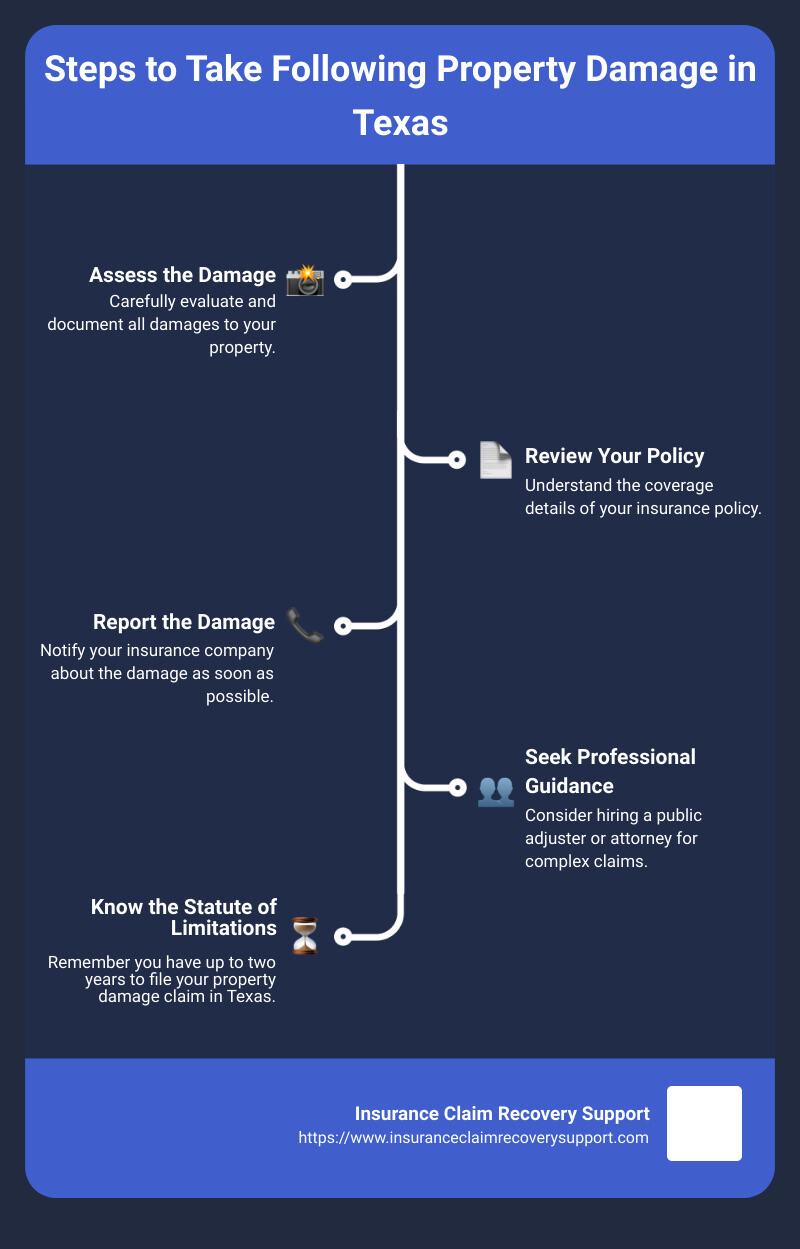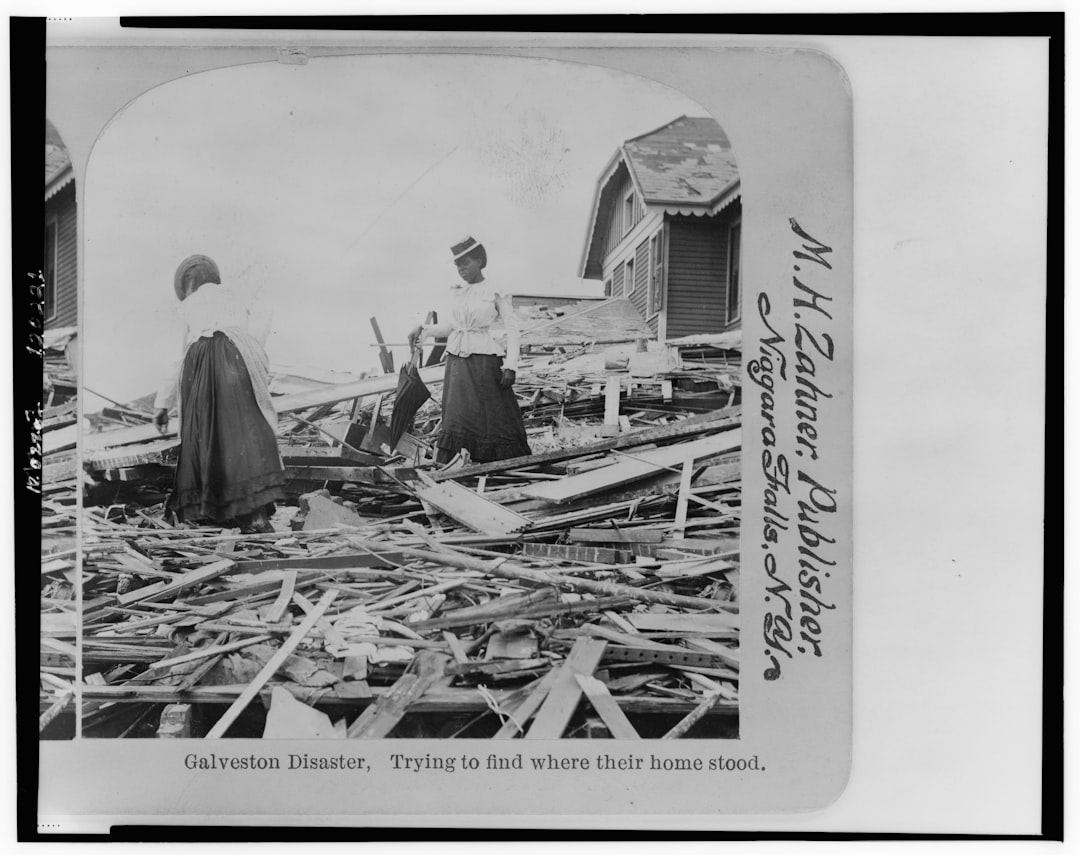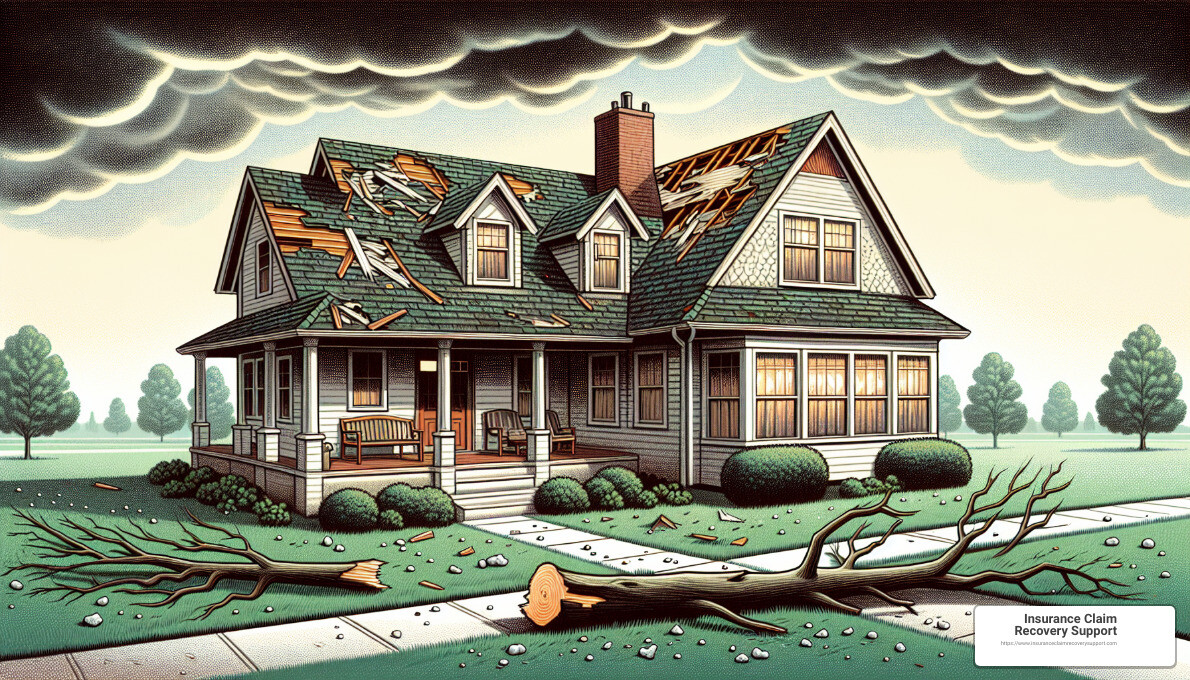Navigating Property Damage Claims in Texas: When damage occurs to your property in Texas—whether from storms, accidents, or other incidents—it’s crucial to act fast. Here’s a quick guide to get you started:
- Understand What Constitutes Property Damage: This includes any harm to real estate or personal possessions.
- Know Your Insurance Coverage: Check your policy to understand the type of damage it covers.
- File Your Claim Promptly: Texas law gives you up to two years, but sooner is always better.
- Seek Professional Help if Needed: Consider a public adjuster or attorney for complex cases.
Property damage in Texas can be a complex affair, especially given the state’s propensity for severe weather events like hurricanes, tornadoes, and freezes, not to mention other threats like fires or vandalism. For commercial building owners, multifamily complexes, and other organizational property owners, understanding the importance of timely claims submission cannot be overstated. Getting a handle on the scope of damage, navigating the insurance claim process, and knowing your rights and deadlines are fundamental steps to ensure you are fairly compensated for your loss. Failure to act promptly or understand the process can lead to unnecessary delays, underpayments, or claim denials. This guide is designed to streamline your understanding and action plan following property damage in Texas.

Understanding Property Damage Laws in Texas
When you’re dealing with property damage in Texas, whether it’s a dented car bumper or a flood-damaged home, knowing the legal landscape is your first step toward recovery. Let’s break down the essentials, keeping things as straightforward as possible.
Statutory Limits
In Texas, the clock starts ticking the moment your property is damaged. You have 2 years to file a claim for damages. This might seem like plenty of time, but life gets busy, and delays can happen. If you were away or physically unable to file, extensions might be granted. The key takeaway? Don’t wait. Start your claim process as soon as you can.
Texas Tort Claims Act
This act is a bit of a game-changer because it allows you to seek damages from the government—a route not always available in every state. If your property was damaged due to a government entity’s actions (or lack thereof), this act is your friend. But, navigating claims against the government can be complex, so understanding the specifics of this act is crucial.
Comparative Negligence
Things get a bit tricky here. If you’re found to be 51% or more at fault for the damage, you’re out of luck in terms of compensation. This rule is all about fairness, ensuring that those who significantly contribute to their own property damage can’t then turn around and claim full damages. It’s a reminder to always act responsibly, as your actions can directly impact your ability to recover losses.
Class C Misdemeanor
If the property damage is minor (under $200), and especially if it involves a traffic incident where you didn’t stop or move your vehicle safely, you could be facing a Class C misdemeanor. It might sound minor, but it’s a legal issue you’ll want to avoid.
Class B Misdemeanor
For more serious damage (over $200), the legal stakes rise to a Class B misdemeanor. This could involve more significant property damage scenarios, like hitting a parked car and not properly reporting it. The repercussions here are more severe, emphasizing the importance of handling property damage responsibly.
Understanding these laws and regulations is your foundation for navigating property damage claims in Texas. Each point highlights the importance of acting promptly and responsibly, both at the scene of any incident and in the legal aftermath. Whether it’s a minor fender-bender or significant damage to your home, knowing your rights, responsibilities, and deadlines ensures you’re prepared to seek the compensation you deserve.
Next, we’ll dive into the specifics of filing a property damage claim, from assessing insurance coverage to understanding the nuances of replacement costs and repair estimates.
Filing a Property Damage Claim: The Process
When you’re facing property damage in Texas, the steps you take can significantly impact your ability to recover costs for repairs or replacement. Here’s a straightforward guide on how to navigate this process effectively.
Insurance Coverage
First things first, check your insurance policy. It’s crucial to know what your policy covers and what it doesn’t. Different policies have different levels of coverage for property damage, including but not limited to, acts of nature, vandalism, and accidents. Understanding your coverage will set clear expectations for what financial support you can anticipate.
Proof of Ownership
Gather and prepare proof of ownership for the damaged property. This could include purchase receipts, photos of the items before the damage, and any other documents that prove you own the property and its condition prior to the incident. Insurance companies will require this evidence to process your claim.
At-fault Party’s Insurance
If another party is at fault for the damage, you’ll need to deal with their insurance company. This is known as a third-party claim. In such cases, it’s beneficial to collect all necessary information from the other party at the scene of the incident, including their insurance details. Documenting everything is key — take photos, note down the time and date, and if there are any witnesses, get their contact information too.
Replacement Cost vs. Repair Estimates
Understanding the difference between replacement cost and repair estimates is crucial. Replacement cost is the amount it would take to replace your damaged property with a new one of similar kind and quality. Repair estimates, on the other hand, are quotes from professionals on how much it will cost to repair the damaged property.
-
Replacement Cost: This is often used when the property is deemed a total loss. Your insurance policy may cover the replacement cost, allowing you to replace what was lost without paying out of pocket, aside from your deductible.
-
Repair Estimates: Obtain multiple repair estimates from reputable contractors. This not only gives you an idea of the cost involved but also strengthens your claim by providing concrete figures for the insurance company to consider.
Contacting Your Insurance Company
Once you have all the necessary documentation and information, contact your insurance company to file the claim. Provide them with all the details of the incident, including proof of ownership, any estimates for repairs, and information on the at-fault party if applicable.
Remember, the sooner you contact your insurance company, the better. Prompt action ensures that your claim is processed quickly and reduces the chances of further damage, which might not be covered if you delay taking protective measures.
Next Steps
After filing the claim, your insurance company will likely send an adjuster to assess the damage. This is where your documentation, repair estimates, and any proof of ownership you’ve gathered will come into play. Be sure to cooperate fully with the adjuster, but also know your rights and the details of your policy.
Filing a property damage claim in Texas can seem daunting, but with the right preparation and understanding of the process, you can navigate it smoothly. Keeping clear records, understanding your insurance coverage, and acting promptly are your best strategies for a successful claim process. Moving forward, we’ll explore the statute of limitations for property damage claims in Texas, ensuring you’re well-informed of all legal timelines and restrictions.
Statute of Limitations for Property Damage Claims in Texas
When it comes to property damage in Texas, there’s a ticking clock you need to be aware of. It’s called the statute of limitations. Let’s break down what this means for you and your claim.
Two-year Deadline
In Texas, you have two years from the day your property was damaged to file a lawsuit. Think of it like a countdown. The day your property gets damaged, the clock starts ticking. Once those two years are up, you can’t sue to get money for your damages. This rule covers most types of property damage, whether it’s your car, your house, or your favorite lawn gnome.
Legal Disabilities
There are some exceptions to this rule. If someone can’t file a claim because of a “legal disability” – like being under 18 years old, or not mentally capable – the clock might not start ticking until that disability is gone. For example, if you were 17 when your property got damaged, you might have until you’re 19 to file a claim.
Tolling Exceptions
Sometimes, the countdown can pause. This is called “tolling.” It’s rare, but there are situations where the law says it’s only fair to stop the clock. These can be complicated, and each case is different, so if you think this might apply to you, it’s a good idea to talk to a lawyer.
Construction Defects
Here’s where things get a bit more complex. If your property damage is because of a construction defect, the rules change a bit. You might have up to four years if it’s about a broken contract, but there’s also a ten-year limit for suing over construction defects, no matter what. This ten-year rule is like a final deadline. Even if you didn’t know about the defect until nine years in, you only have that one last year to file your claim.
So, why does all this matter? Because timing is everything. If you wait too long, you could miss your chance to get help fixing your damaged property. It’s like missing the bus because you lost track of time. Only in this case, another bus isn’t coming.
If you’re dealing with property damage, it’s smart to start figuring out your next steps as soon as possible. And remember, if any of this feels overwhelming, you’re not alone. Groups like Insurance Claim Recovery Support LLC are here to help guide you through the process, making sure you understand your rights and options every step of the way.
Seeking Compensation for Property Damage
When you’re facing property damage in Texas, the road to compensation can seem like a maze. Let’s break it down into simpler paths: Tort law, Financial reimbursement, Governmental agencies, Negligence responsibility, and Insurance policy limits.
Tort Law
In Texas, tort law is your flashlight in the dark. It helps you see how to hold someone responsible if their negligence led to your property damage. Think of it as the rule book for saying, “You broke it, you fix it.” But remember, Texas is keen on tort reform, which means there are specific rules about how and when you can seek compensation.
Financial Reimbursement
Getting money to fix or replace your damaged property is the goal. Whether it’s a dented car or a flooded basement, you’re looking for financial reimbursement. This means proving the damage and its costs. It’s like showing receipts for a broken vase — you need to prove what was broken and how much it costs to fix it.
Governmental Agencies
Here’s where it gets interesting. Unlike many states, Texas lets you go after governmental agencies under the Texas Tort Claims Act if they’re responsible for your property damage. Picture this as being able to call out someone who knocked over your mailbox, even if they’re wearing a city uniform.
Negligence Responsibility
This is a big one. Texas follows a rule called “comparative negligence.” Simply put, if you’re more than half responsible for what happened, you can’t collect damages. It’s like being in a cookie jar theft where you ate more cookies; you’re mainly at fault.
Insurance Policy Limits
Knowing the limits of your insurance policy is crucial. These limits are the maximum amount your insurer will pay out for a claim. It’s like knowing how much money you have in your pocket; you can’t spend more than what’s there.
Navigating these aspects of property damage claims in Texas can be daunting. But with the right help, like from Insurance Claim Recovery Support LLC, you can tread this path more confidently. They’re like having a guide in a dense forest, helping you avoid the pitfalls and get to your destination: fair compensation for your property damage.
Remember that time is of the essence, and understanding your rights and responsibilities is key. With the right approach and expert help, seeking compensation for property damage doesn’t have to be a journey you take alone.
Navigating Insurance Claims with Insurance Claim Recovery Support LLC
When it comes to property damage claims in Texas, navigating the insurance claim process can feel like trying to find your way through a maze. That’s where Insurance Claim Recovery Support LLC steps in, acting as your compass and guide.
Advocating for Policyholders
Insurance Claim Recovery Support LLC stands firmly on the side of the policyholder. Imagine having someone in your corner, fighting for what you deserve, not just what the insurance company is willing to give. This is what they do. They ensure that your claim isn’t just another file on an adjuster’s desk but gets the attention and settlement it rightfully deserves.
Maximizing Settlement
The goal is simple: secure the maximum settlement possible for your claim. This means meticulous documentation of your damages, expert negotiation tactics, and a deep understanding of your policy’s fine print. Insurance Claim Recovery Support LLC knows the ins and outs of the Texas insurance landscape, especially when it comes to fire and storm damage, which are all too common in the Lone Star State.
Texas Fire and Storm Damage
Texas’s climate can be unforgiving, leading to unique challenges for property owners. From the devastating effects of wildfires to the destructive power of hurricanes and tornadoes, Texas sees it all. Insurance Claim Recovery Support LLC specializes in these types of claims. They understand not only the emotional toll these disasters take but also the financial strain they can cause. Their expertise lies in navigating these complex claims, ensuring you’re not left to deal with the aftermath alone.
Insurance Claim Process
Filing a property damage claim involves several steps, from documenting the damage to negotiating with insurance adjusters. Insurance Claim Recovery Support LLC guides you through each step. They help prevent common mistakes that can delay your claim or reduce your compensation. With their support, you’ll understand what to expect at each stage, including:
- Immediate steps to take after damage occurs: Securing your property, documenting the damage, and notifying your insurance company.
- Working with adjusters: Preparing for inspections, understanding adjuster estimates, and advocating for a fair assessment.
- Settlement negotiations: Ensuring the offer from the insurance company reflects the true cost of repairs or replacement.
Navigating insurance claims with Insurance Claim Recovery Support LLC means you have an expert team dedicated to your cause. They work tirelessly to ensure that you receive the compensation you deserve, helping to rebuild and restore without undue financial burden.
As we conclude this section, it’s clear that with Insurance Claim Recovery Support LLC, you’re not just filing a claim; you’re setting the stage for recovery and rebuilding. Their commitment to advocacy, expertise in Texas-specific damages, and thorough understanding of the insurance claim process make them an invaluable ally in securing the settlement you need to move forward.
Conclusion
Filing property damage claims in Texas can seem daunting, especially in the wake of a stressful event like a storm or fire. However, the key to navigating this process successfully lies in understanding the importance of effective claim filing and seeking the right legal guidance. With the support of Insurance Claim Recovery Support LLC, you’re equipped with a powerful advocate dedicated to maximizing your settlement and guiding you through every step of the process.
Effective Claim Filing is crucial. It starts with timely notification to your insurance company and meticulous documentation of the damage. This initial step sets the tone for your claim, and doing it right can significantly impact the outcome. The details matter. From photographs of the damage to keeping a record of all related expenses, these pieces of evidence are your claim’s foundation.
The Importance of Legal Guidance cannot be overstated. Navigating the complexities of property damage laws and insurance policies in Texas requires expertise. Legal professionals not only help you understand your rights but also ensure that your claim meets all regulatory requirements and deadlines. This expertise is particularly crucial when disputes arise, or when the insurance company’s offer doesn’t match the actual damage costs.
Insurance Claim Recovery Support LLC Support is your ace in the hole. With a deep understanding of Texas-specific damages and a commitment to policyholder advocacy, our team is here to help you every step of the way. Whether it’s assessing the damage, negotiating with insurance adjusters, or providing expert advice on maximizing your claim, we’re here to ensure that you receive the fair settlement you deserve. Our services are designed to take the burden off your shoulders, allowing you to focus on recovery and rebuilding.
In conclusion, while the road to recovery after property damage can be challenging, it’s not one you have to walk alone. With effective claim filing strategies, the right legal guidance, and the unwavering support of Insurance Claim Recovery Support LLC, you can navigate the insurance claim process with confidence. Let us help you rebuild, restore, and return to normalcy with the financial compensation you rightfully deserve.










